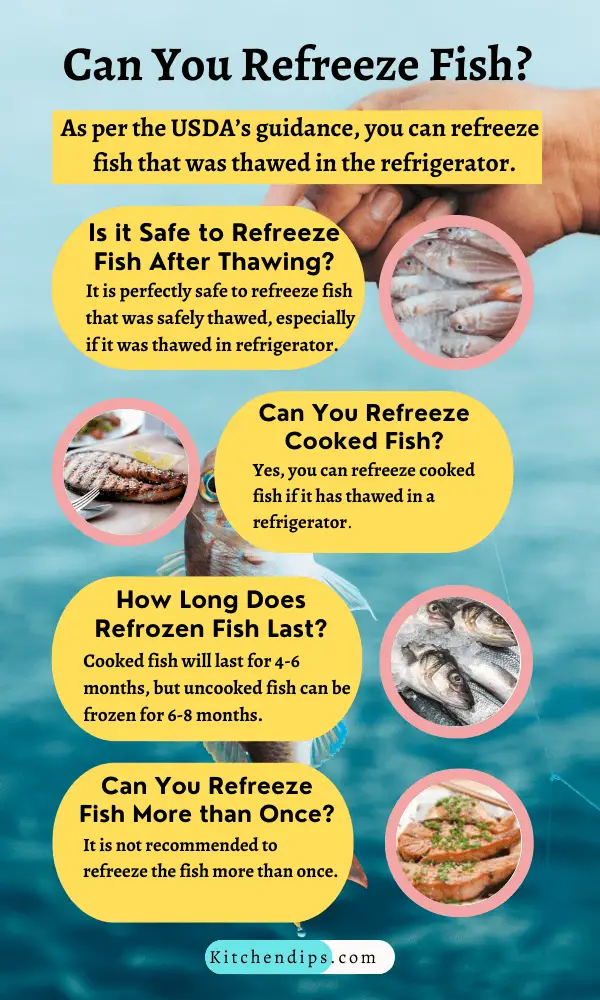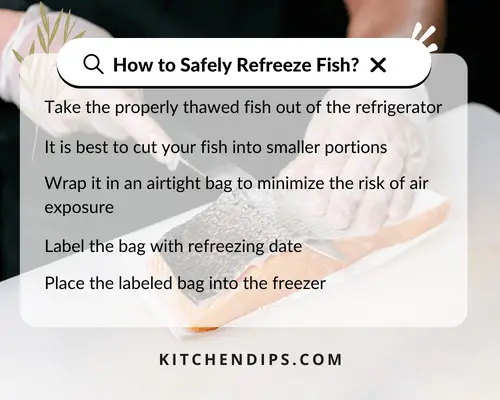People who don’t have access to fish all year round might prefer buying fish in bulk and then freezing the extra portion to elongate its shelf life.
But, if the frozen fish was accidentally thawed due to a blackout/freezer malfunction, they might be looking for a way to save it from wastage it might leave them wondering, can you refreeze fish?
You can refreeze fish if it has thawed in a refrigerator. How well the fish tastes after refreezing depends on how well you handled it. Cooked/uncooked fish might last for up to 4-8 months after refreezing.
You can refreeze the fish in meal-size portions so that you don’t have to throw away the accidentally thawed portion of fish. Properly thawed and refrozen fish will stay flavorful and safe after refreezing.
Table of Contents
Is it Safe to Refreeze fish?

Fish is considered one of the most loved seafood. Refreezing fish is safe as long as you thaw it in a refrigerator. It is important to wrap it properly and keep out as much air as possible to ensure proper refreezing.
Bear in mind that even if you follow the refreezing instructions correctly, you might still notice a decrease in the overall quality. But, that doesn’t mean that the fish has turned bad.
You should avoid refreezing the fish defrosted in a microwave, on the counter, or under cold water. Defrosting fish by these methods will significantly degrade the cell structure and dry out the texture.
It is also not recommended to refreeze the fish sitting out at room temperature for more than 2 hours. Once the bacteria have started growing, it is best to discard the fish as eating it might be unsafe for consumption.
Suppose you accidentally defrost fish using a method other than the refrigerator. In that case, you can cook the fish and then refreeze it. Cooked fish might not retain as much flavor, but it will remain safe for eating.
How to Safely Refreeze Cooked/Uncooked Fish?

Fish that was appropriately thawed can be safely refrozen. You can follow the steps mentioned below to ensure the safe refreezing of cooked/uncooked fish.
- Take the properly thawed fish out of the refrigerator. You can refreeze the whole fish or cut it into small pieces before moving on to the next step.
- Next, place the fish on a freezer-safe tray. Place the fish in such a way on the tray that no parts are in contact with one another.
- Pop the tray into the freezer and flash-freeze the fish. Once the fish has frozen solid, take the tray out of the freezer. Start wrapping each frozen piece individually in plastic wrap.
- After wrapping the fish in plastic wrap, place it in an airtight bag/container. Double wrapping the fish will minimize the risk of air exposure.
- After that, label the bag with refreezing date. Doing so will ensure you don’t forget the exact date you refroze it.
- Place the labeled bag into the freezer until the next time you want to use it.
Note: You can also vacuum-seal the fish after flash-freezing it instead of double-wrapping.
How Long Can You Refreeze Fish?
Properly handled uncooked fish can be kept refrozen for 6-8 months. It will not taste as good as fresh fish. But it will still be safe for eating.
Cooking the uncooked refrozen fish after seasoning it with spices will make the fish taste better and make up for the compromised flavor.
On the other hand, cooked fish will last you for 4-6 months after refreezing. However, the overall quality degradation will be more prominent in this case. The fish meat might start crumbling, but that doesn’t mean the fish has spoiled.
If you observe the signs of spoilage even before the recommended time limit has been crossed, the fish should be discarded.
Can You Refreeze Fish More than Once?
It is not recommended to refreeze the fish more than once. The cell structure of the fish undergoes a considerable amount of degeneration when it is thawed and refrozen.
If you refreeze the fish for the second time, you’ll observe that the fish has lost the juicy texture and a lot of flavors. Moreover, refreezing it a second time might also make it unsafe for consumption.
If you want to enjoy the fish for a long time, you can refreeze it in portions. Refreezing in portions will enable you to thaw the required amount only. It will save the remaining portion from unnecessary thawing and help it retain better taste and texture.
How to Tell if the Fish Has Gone Bad?
You can quickly tell if the fish has spoiled or gone bad if you notice these changes.
- If the fish has a dull and brittle color, it has probably already spoiled or is about to spoil.
- Fish meat with a slimy texture also indicates that the fish has gone bad.
- If the fish appears brown instead of a light pink or salmon pink color, it has turned sour.
- A foul and overly strong fishy smell will also help you detect if the fish has gone rancid.
These are some of the most prominent signs that will help you realize if the fish is appropriate for use or not.
In case you purchase a whole fish instead of fillets/slices, a few other signs can also help you understand if the fish is fresh or not. These signs include the appearance of scales, whether the eyes are crystalline or murky, etc.
If you notice any of the signs mentioned above, you better discard the fish as it has become unsafe for consumption. Foods that are about to spoil have potential health risks, so you should avoid eating them.
Frequently Asked Questions
How many times can you thaw and refreeze fish?
It is recommended to refreeze the cooked and uncooked fish only once. Refreezing it more than once will cause the quality to suffer and the fish might become unsafe for consumption. However, uncooked fish can be refrozen once more if you cook it before refreezing.
Can you refreeze fish thawed at room temperature?
Refreezing fish thawed at room temperature is strictly advised against. It is because if you thaw the fish at room temperature, it gets exposed to air for a long period. Long air exposure might speed up bacterial growth and result in spoilage.


